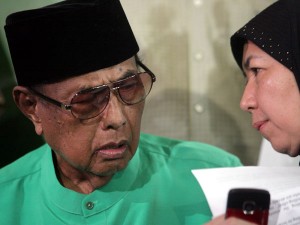MANILA, Philippines—Until the talks bogged down, Agbimuddin Kiram and his armed followers were offered an exit pass by Philippine and Malaysian officials out of Sabah without any charges but on the condition they hide their arms first, officials said Wednesday.
That “window of opportunity” was open for over a week—from the time Gov. Mujiv Hataman took over the talks with the Kiram clan on Feb. 17 until President Aquino first made a national address on the Sabah standoff on Feb. 26—but the Kirams did not grab the chance.
Hataman presented the offer on the second day of his meeting with Sulu Sultan Jamalul Kiram III in Manila in back-channel talks that nearly climaxed in a breakthrough—a Kiram brother agreeing to fly to Malaysia to talk the armed men out of Sabah—but fell through.
“Until the time the President spoke, there was this wonderful window where Malaysians agreed that the only thing they had to do was get rid of their weapons—either bury them, hide them—come home. No charges will be filed here in the Philippines; no charges will be filed in Malaysia,” Secretary Rene Almendras said in an interview.
Sabah claim to be revived
Both the Philippine and Malaysian governments also agreed that the discussion on the claim to Sabah would be revived, he said.
“The initiative was to give a peaceful, non-embarrassing way to get out of the situation,” he said.
Except for possession of firearms, Agbimuddin and close to 200 followers, who set off by speedboat in Tawi-Tawi and landed on the seaside village of Tanduao in Lahad Datu town on Feb. 9, had not committed any other crime at the time, Almendras said.
Emissaries to sultan
Jamalul, who issued the royal decree authorizing Agbimuddin’s entry into Sabah, and his family in Taguig City, however, were insistent that Malaysians meet them first. The offer did not prosper, officials said.
After news of the incursion into Sabah broke, the President dispatched National Security Adviser Cesar Garcia and his political adviser, Secretary Ronald Llamas, as his emissaries to Jamalul, since both officials were familiar with the Sabah issue.
Aquino later tapped Hataman, acting governor of the Autonomous Region in Muslim Mindanao; Lt. Gen. Rey Ardo of the Western Mindanao Command; and Police Director Cipriano Querol.
Hataman, for his part, brought in former Ambassador Akmad Sakkam, recently named by Aquino to the Transitional Commission that will draft the basic Bangsamoro law, to establish contact with the Kiram clan. Sakkam is a Tausug like the Kirams.
Timeline
In the face of criticisms of the government’s alleged mishandling of the standoff, Hataman gave the Inquirer a timeline as well as insights into their back-channel negotiations with the Kirams, mainly Jamalul.
Hataman first met with Jamalul, his daughter Princess Jacel and his spokesman Abraham Idjirani at the sultan’s home in Taguig on the morning of Feb. 18, the sixth day of the standoff. He brought with him Sakkam and Querol.
Hataman said he told Jamalul that he had been sent to help defuse the tension, and spelled out Aquino’s policy: “No Filipino should be hurt, much less die in a foreign land.”
The ailing Jamalul’s statement, he said, was curt: “It’s good that you came so we can talk and understand one another better.”
They said they had written the President about the Sabah claim in June 2010, days before he took his oath of office, and felt they had been ignored by the government.
Idjirani also claimed they were not consulted on the preliminary peace deal with the Moro Islamic Liberation Front, while Jacel wondered if the rent paid by Malaysia for Sabah was sufficient to pay for renting an apartment in Manila, according to Hataman.
